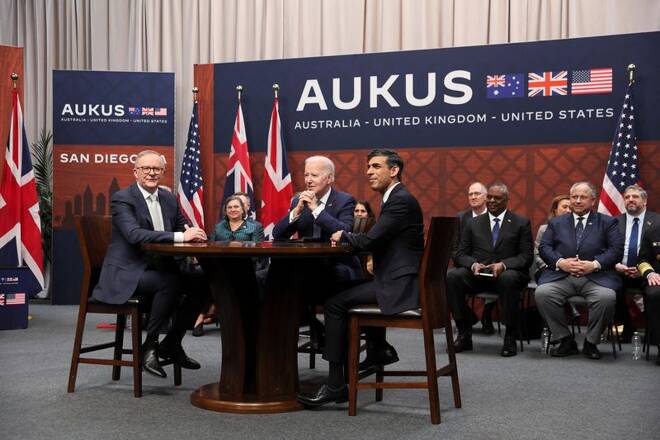Advertisement
Advertisement
Australia PM visits Fiji to discuss nuclear submarines, security
By:
By Kirsty Needham SYDNEY (Reuters) - Australian Prime Minister Anthony Albanese will meet his Fiji counterpart in Suva on Wednesday to press Canberra's message that its $245 billion nuclear powered submarine programme does not violate its nuclear non-proliferation commitments.
By Kirsty Needham
SYDNEY (Reuters) -Australian Prime Minister Anthony Albanese met his Fiji counterpart in Suva on Wednesday to press Canberra’s message that its $245 billion nuclear powered submarine programme does not violate its nuclear non-proliferation commitments.
Australia is party to a nuclear-free zone treaty with 12 other South Pacific nations, including Fiji, in a region where sensitivity over nuclear weapons is high because of the effects of nuclear weapons tests by the United States and France.
The strategically located region has been a focus of rising tension between the United States and China over Beijing’s ambitions to increase its security presence.
China this month renewed its diplomatic push for Pacific island countries to cooperate with it on security, after a proposed 10-nation deal was rebuffed in June.
Albanese met Fijian Prime Minister Sitiveni Rabuka to discuss regional security, a day after unveiling details of the AUKUS submarine programme in San Diego with the leaders of United States and Britain.
Rabuka commended Albanese for “unwavering support, as the two nations work collectively to recover from the pandemic, build defence and security, economic cooperation, climate action initiatives and protect the oceans and the environment”, Fiji’s government said in a statement.
Australia’s defence officials have said the nuclear submarine fleet is needed as a deterrent to China’s naval build up.
China has said AUKUS violates a nuclear non-proliferation treaty, which Australia rejects. Australia emphasised on Tuesday the submarines would not carry nuclear weapons.
China’s special envoy to the Pacific islands, Qian Bo, sought support this month from a sub-regional group of Fiji, Vanuatu, Papua New Guinea and Solomon Islands for a security training and assistance role for China, a statement from the Melanesian Spearhead Group showed.
Qian has visited Papua New Guinea, Vanuatu and the Federated States of Micronesia in the past fortnight. In a statement on March 10, the top official of the Melanesian Spearhead Group (MSG) – an intergovernmental organisation of Fiji, Papua New Guinea, the Solomon Islands, Vanuatu and a pro-independence party of New Caledonia – said it would consider security assistance, including training and equipment from China.
“My members have affirmed in very strong terms that no one will choose their friends or enemies for them,” MSG Director General Leonard Louma said.
Australia National University Pacific expert Graeme Smith said Australia would be worried by the statement from the group, which is less powerful than the 18-member Pacific Islands Forum, but important to Melanesian nations.
It was also likely China would increase its criticism of AUKUS as violating the Pacific nuclear-free treaty in its diplomacy with Pacific islands, he said.
New Zealand’s Foreign Minister Nanaaia Mahuta heads to Fiji on Wednesday, while a U.S. delegation led by White House Indo-Pacific coordinator Kurt Campbell will visit Pacific island countries in coming days, the U.S. embassy in Auckland said.
(Reporting by Kirsty Needham. Editing by Gerry Doyle)
About the Author
Reuterscontributor
Reuters, the news and media division of Thomson Reuters, is the world’s largest international multimedia news provider reaching more than one billion people every day. Reuters provides trusted business, financial, national, and international news to professionals via Thomson Reuters desktops, the world's media organizations, and directly to consumers at Reuters.com and via Reuters TV. Learn more about Thomson Reuters products:
Latest news and analysis
Advertisement
